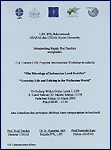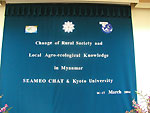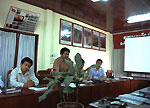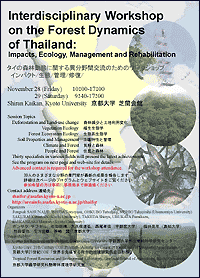| |
| --Research & Education Activities-- |
 |
| Field Station Division/ Area Info Division/ COE Researchers/ International Workshops/ Research Projects |
 |
|
Field stations are the bases for intensive on-site education
and field researches. Cooperation with the local
research and educational institutions is to be enhanced
towards the formation of a multilateral and multi-centered research and
education network through the activities of field stations.
In order to materialize these purposes, existing institutional set up such
as the CSEAS liaison offices
in Jakarta and Bangkok and MOUs (Memorandum of Understanding,
agreements with the purpose of international academic exchange)
are utilized. After the termination of the 21st Century
COE Program, some of the Field Station will be maintained
by a new large-scale program, while the management of others
will gradually be transferred to local institutions.
|
|
 Outline and News of Field Stations Outline and News of Field Stations
• Click the name of countries to read the outline and news of Field Stations.
 |
|
Area Studies Information Center (Area Info)
Since fiscal year (FY) 1998, the Center for Southeast Asian
Studies and the Graduate School of Asian and African Area
Studies
have been working together on a COE (Center of Excellence)
program
"Creating Regions: Proto-Areas, Transformations and New Formations
in Asia and Africa." Under it, a vast amount of literature,
micro-films/fiches, maps, images and other data have been
collected
and organized with a view to creating an "Area Studies Information
Center"(or "Area Info") as an advanced research and education
center for area studies.
As a follow-up, this 21st Century COE Program will also be
engaged in a variety of activities for the creation and betterment
of
the Center. In the Area Info Division, which is part of the
21st Century COE's research organization, a great deal of
thought
will be given to the function and role the Center should play,
and will work to substantiate them.
In FY 2002, the 21st Century COE computer server was set up,
and hardware equipment was installed to facilitate better communication
with the field stations. Plans for the coming fiscal year include
the start-up of an electronic bulletin board system and mailing
lists to expedite exchanges of information and communications
among researchers, students and educational and research institutes
involved in area studies. There are also plans for the development
of a database system to deal with various field study materials
and information in an integrated manner as well as the introduction
of a participatory area study database system, in which database
users can participate in the updating of data.
As is indicated by efforts described above, one of the objectives
of the "Area Studies Information Center" is to start a network-type
area study organization consisting of a number of communication
modules, thereby forming a non-hegemonic academic exchange network
in the field of area studies.
There are many other functions and roles the Center is expected
to play, and they will be presented at appropriate times.
Finally, a comment is due regarding the relationship between
the "Center for African Area Studies" and the "Area Studies
Information Center" The Center for African Studies was established
in April, 1986 and re-organized in 1996 by Kyoto University,
and has worked to collect, organize and dispatch information
on Africa with the aim of forming an academic exchange network
with other research institutions both at home and abroad. The
center, in cooperation with the Graduate School of Asian
and
African Area Studies and the Center for Southeast Asian Studies,
is currently reviewing its organization. If the review goes
smoothly, the Center will, in the near future, be reorganized
and expanded as the "Area Studies Information Center" scheduled
to be established by Kyoto University.
|
|
|
| |
"Crossing Disciplinary Boundaries and Re-visioning Area Studies: Perspectives from Asia and Africa"
November 9-13, 2006
Japan
|  |
|
 |
| |
Indigenous Communities: Voices towards Sustainability
March 13, 2006
Malaysia
|  |
|
 |
| |
Concepts and Perceptions on African Way of Rural Development Based on Area Studies
December 12-13, 2005
Tanzania, Dar es Salaam
|  |
|
 |
| |
The 7th Kyoto University International Symposium, 2005
Coexistence with Nature in a ‘Glocalizing’World
-Field Science Perspectives-
November 23-24, 2005
Swissôtel Nai Lert Park, Bangkok
 PHOTO GALLERY (Japanese) PHOTO GALLERY (Japanese)
|
 |
|
 |
|
International Symposium on Geo-Informatics for Historical Studies in Asia
November 12-14, 2005
Hanoi, Vietnam
|  |
|
 |
| |
On-Site Joint Seminar "Conservation and Sustainable Utilization of Rain Forest"
February 16, 2005
WWF office, Yokadouma, Cameroon
|
 |
|
| |
 "Workshop Jointly Organized by the Cameroon Field Station and WWF -Cameroon" "Workshop Jointly Organized by the Cameroon Field Station and WWF -Cameroon"
HATTORI Shiho |
|
 |
| |
"Workshop on Local Knowledge and Its Potential Role for Sustainable Agro-Based Development in Lao PDR"
February 9-10, 2005
Laos
|
 |
| |
 Comparative Area Studies: "21COE Laos Field Station Report on the Study Tour" Comparative Area Studies: "21COE Laos Field Station Report on the Study Tour"
(February 11-12, 2005)
KOSAKA Yasuyuki |
|
| |
 PHOTO GALLERY (Japanese) PHOTO GALLERY (Japanese) |
|
 |
| |
Workshop "The Micrology of Indonesian Local Societies"
March 23, 2004
Jakarta, Indonesia
 PHOTO GALLERY PHOTO GALLERY |
 |
 |
 |
| |
Workshop "Change of Rural Society and Local Agro-Ecological Knowledge in Myanmar"
March 16-17, 2004
SEAMEO-CHAT, Myanmar |
 |
|
 |
| |
Laos Field Station Workshop "Forest Management and Conservation in Laos"
January 25, 2004
ASAFAS, Kyoto University |
 |
|
 |
| |
On-Site Joint Seminar "Conservation and Sustainable Utilization of Rain Forest"
December 10, 2003
WWF office, Yokadouma, Cameroon
|
 |
|
| |
 "Cameroon Field Station and WWF Joint Seminar" "Cameroon Field Station and WWF Joint Seminar"
KIMURA Daiji |
|
 |
| |
Workshop "Interdisciplinary Workshop on the Forest Dynamics of Thailand:
Impacts, Ecology, Management and Rehabilitation"
November 28-29, 2003
Shiran Kaikan, Kyoto University |
 |
|
 |
| |
Joint Workshop "Environment, Livelihood and Local Praxis in Asia and Africa"
October 20-30, 2003
Addis Ababa University, Ethiopia
( Ethiopia Field Station HP) Ethiopia Field Station HP) |
 |
|
| |
 Comparative Area Studies: "21COE Ethiopia Field Station Report on the Study Tour" (October 24-27, 2003) Comparative Area Studies: "21COE Ethiopia Field Station Report on the Study Tour" (October 24-27, 2003)
HIRAI Masaaki |
|
| |
 PHOTO GALLERY PHOTO GALLERY  |
|
 |
|
 Information and Previous Activities Information and Previous Activities |
The common research theme encompasses four problem-areas
of research, namely: Human Ecology Issues, Social and Cultural Issues,
Political and Economic Issues,
and Area Studies Issues. |
  |
  |
  |
  |
|
|
|
|
| |
| |
|
|
|

